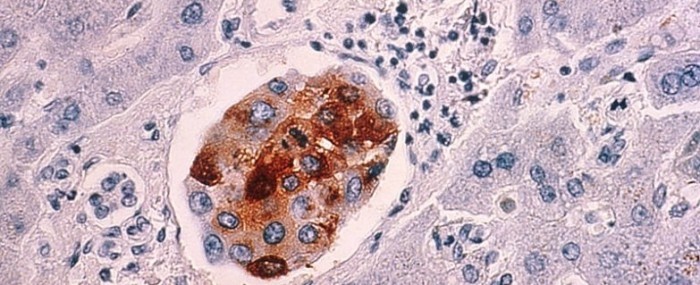
Artificial intelligence at the service of cancer diagnosis
04 de setembro de 2018By Claudia Izique | FAPESP Research for Innovation – Onkos Diagnósticos Moleculares, a Brazilian startup based at the Supera Technology Innovation Park in Ribeirão Preto, São Paulo State, has offered a new diagnostic test for the classification of indeterminate thyroid nodules since March. The test was developed in partnership with the Barretos Cancer Hospital and with support from FAPESP’s Innovative Research in Small Business Program (PIPE).
Thyroid nodules are estimated to occur in approximately 60% of the Brazilian population. In accordance with international guidelines, most nodes are drained by fine needle aspiration (FNA). “The result is negative for cancer in approximately 75% of cases,” says biologist Marcos Tadeu dos Santos, who founded Onkos.
When a malignancy is identified, the recommendation is surgical removal of all or part of the thyroid gland. Some 20%-30% of aspirated nodules are classified as indeterminate, and these patients are advised on a precautionary basis to undergo surgical thyroidectomy. However, postsurgical analysis reclassifies most of these cases as benign.
“Our test is indicated precisely for patients who may be subjected to surgery unnecessarily,” he explains.
The test developed by Onkos, called mir-THYpe, analyzes the expression of 11 microRNAs (regulators of gene expression) in indeterminate nodules and uses an artificial intelligence algorithm to classify them as negative or positive. “The predictive value of a negative result from this test is 96%,” Santos says, referring to cases in which cancer is ruled out. The positive predictive value (when the test indicates malignancy) is 76%.
The test does not require the patient to undergo another fine needle aspiration because it uses the original FNA sample. “As well as saving the patient from a second painful and distressing procedure, it saves money for whoever’s paying,” Santos notes.
Because a second sample does not have to be taken, the firm can offer the test to patients throughout Brazil and has developed a transport kit to enable the analysis of material sent from any location. “The patient requests the transport kit, sends the sample to Onkos in Ribeirão Preto for analysis, and receives the diagnosis via the internet,” he says.
The technique, which is often referred to as gene expression profiling, was used between March 2016 and April 2017, while the firm had support from PIPE Phase 1 for proof of concept. “In fact, we went well beyond proof of concept, completing 70% of the development and validation process, and then performing the other procedures on our own account,” Santos recalls.
In his view, mir-THYpe has the potential to avoid 81% of unnecessary thyroidectomies and save up to 66% of treatment costs for these patients. “It’s a win-win-win, better for the patient, for the physician, and for whoever’s paying,” he says.
With mir-THYpe on the market, Onkos is now leveraging PIPE Phase 2 to expand the number and diversity of the samples used to validate this diagnostic service. To this end, it is conducting a multicenter study with the participation of several universities, laboratories and hospitals in Brazil and other Latin American countries.
“We plan to enhance the power of a molecular classifier to distinguish between benign and malignant samples to obtain more sensitive and specific results, focusing on the improvement of the negative predictive value and the inclusion of specific mutations,” Santos says. The project will be completed in 2020.
Molecular markers
Having mastered the technique, Onkos was motivated to investigate the use of molecular markers to identify aggressive variants in patients with prostate cancer, with new support from PIPE Phase 1. “The idea here is similar, namely, reducing unnecessary treatments and procedures in prostate cancer patients by developing a more objective tool,” Santos says.
The goal, he explains, is to develop a test to predict the risk of biochemical relapse and progression of a tumor to metastasis in patients who undergo radical prostatectomy. The research project is being conducted in partnership with the Barretos Cancer Hospital.
“We’ve already developed the markers and are now testing algorithms to validate the test,” Santos says. “Currently, 65% of patients classified as high risk on the basis of clinical criteria are reclassified as low risk by our test, with a predictive value of 95%.”
With two research projects under way, the firm recently won a prize for a third study, in which it developed a test that also uses AI to identify the primary origin of metastatic tumors. Onkos won the prize for the category “Technological Innovation in Oncology” in the 9th edition of the Octávio Frias de Oliveira Awards, an initiative of the São Paulo State Cancer Institute (ICESP).
“In 3%-5% of cancer cases, currently available tools can’t identify the primary origin of the tumor. This information is vital to a decision regarding the best treatment,” Santos says. “We analyze 95 genes and compare them with a database containing almost 4,500 samples of 25 cancer types to suggest the probable primary origin of these tumors. Our accuracy is 84%.”
Onkos has a staff of four at present. “Three have scholarships and they each have a master’s degree or PhD,” he notes.
The firm is ready to expand. “We have pent-up demand and need capital to expand,” he says. Onkos enjoys a positive reputation in the market, ranking fifth in the Brazilian healthcare sector according to the 2018 edition of 100 Open Startups announced in July. It is currently in conversation with two investment funds.
Company: Onkos Diagnósticos Moleculares
Site: onkos.com.br
Location: Parque Tecnológico de Ribeirão Preto – Supera/USP
Address: Avenida Dra. Nadir Aguiar, 1805, Ribeirão Preto (SP), 14056-680, Brazil
Tel: +55 11 3315-0735
